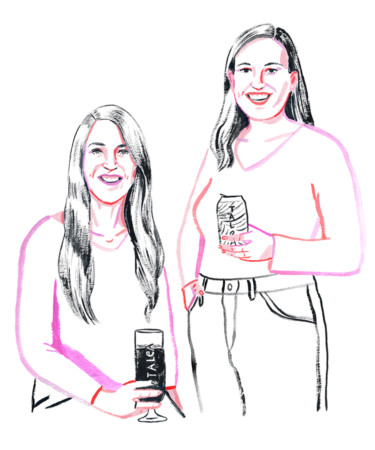This article is a part of our inaugural Next Wave Awards. For the full list of 2021 winners, check out the whole series here.
Talea Beer Co. co-founders Tara Hankinson (“Ta”) and LeAnn Darland (“Lea”) are small brewery owners with big plans. Formerly colleagues at Hopsy, a beer growler delivery startup, the two discovered that from disparate paths — Hankinson most recently from The New York Times, following marketing consulting roles for Brooklyn Winery and Wolffer Estate Vineyards; and Darland from Google and earlier in her career, the U.S. Navy — they found themselves staring down the same dream: to create a beer brand that felt welcoming to them as women in a male-dominated industry.
Armed with MBAs, beer experience, and homebrewing skills, they established Talea Beer Co.’s LLC in 2018. In 2019, Talea launched its contract-brewed beer brand and quickly had relationships at local retailers — and shelf space at Whole Foods.
In that first year, Talea established itself as New York City’s first wholly female-founded, female-focused beer brand. They did this by offering “easy-to-love” beer styles — the trendy yet approachable flagship Sun Up Hazy IPA soon listed among VinePair’s best summer beers 2019, along with a suite of fruited sour ales, from the approachable Raspberry Crush Gose to the mouth-puckering, cocktail-inspired Tart Deco tropical IPA series, all with bright and colorful cans designed by I Want Design.
In March 2021, Talea unveiled its first brick-and-mortar brewery and taproom in Brooklyn, N.Y. Spread across a highly trafficked corner of residential Williamsburg, Talea’s space is a 9,000-square-foot accomplishment in airy architecture and stunning interior design (both by Sarah Carpenter of Carpenter and Mason).
Colors splash across the spacious taproom from the tables to the tiled walls. Concealed in the back is a 6,000-square-foot brewery that is now churning out all Talea beer (formerly contract-brewed at Torch and Crown in the Bronx, all Talea beer is now produced in-house, according to the co-founders).
The space is an intentionally “bright, airy respite from the city,” Hankinson says, to welcome women as well as men, with equal attention paid to the Instagramming Saturday brunch set and bona fide beer nerds.
In August, Talea partnered with Union Beer Distributors and more than tripled its distribution footprint, adding to chain retailers including Trader Joe’s, and a current trial with Costco.
Now seven months in, “I feel like we’re hitting our groove,” Hankinson says. The brewery is producing about 1,500 barrels of a 4,000-barrel capacity this year, “so there’s room to grow,” Darland says. Grow, it will: The brewery projects producing closer to 3,000 barrels next year, and plans to add enough tanks to increase capacity to between 8,000 and 10,000 barrels per year.
Beyond the brewhouse, Talea plans to open a second taproom on Bergen Street (bordering the Cobble Hill and Boerum Hill neighborhoods in Brooklyn) next year — and its plans don’t stop there. Leveraging the Farm Brewer license privileges, which allow New York brewers up to five locations in the state, they’re “looking at locations” in Manhattan and in the Hamptons to expand to in the next two to three years, Darland says.
What is truly innovative about Talea Beer Co. is far more than meets the eye, or even the lips: Darland and Hankinson take a 360-degree approach to making the brewery accessible for its customers, as well as its 30-plus employees, including physically.
“No one is expected to lift a half-barrel keg on their own. We bought equipment to do that,” Darland says. “We’ve also come up with ways for short or smaller people in general to lift 50-pound grain bags. It doesn’t take too much creativity to do this.” At a recent forklift training for six employees, “the forklift trainer said he’d never had an all-female group before,” Darland says. (She quotes a common refrain too many female forklift operators hear from distributors: “Go get the forklift guy.”)
“Everyone is cross-trained in at least three to four front-of-house roles,” Hankinson says. “It’s a lot more training and hand holding and coaching,” she admits, but it’s one of the many ways Talea “breaks down the barrier between front of house and back of house.”
Currently, two front-of-house employees are transitioning to back-of-house roles in the brewery. And additional opportunities for employees include a monthly “brewery 101” and beer tastings.
The point of all of this is “making sure everyone can do every role here,” Darland says. In doing this, the company is proving that the way to free the “pipeline” that prevents female involvement in the industry is as simple as investing in the tools that make it possible.
